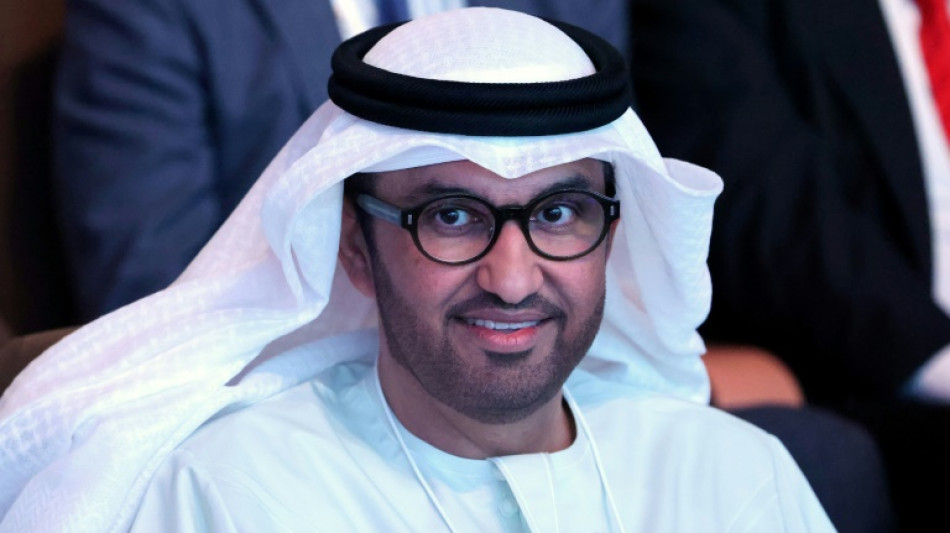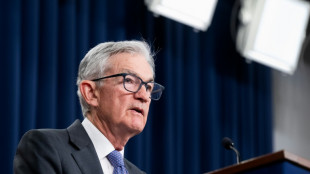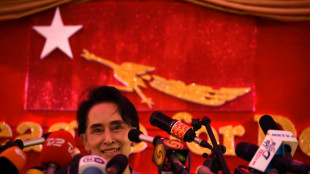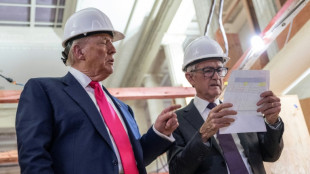
-
 Trump says US will take Greenland 'one way or the other'
Trump says US will take Greenland 'one way or the other'
-
Asian equities, precious metals surge as US Justice Dept targets Fed

-
 Myanmar pro-military party claims Suu Kyi's seat in junta-run poll
Myanmar pro-military party claims Suu Kyi's seat in junta-run poll
-
Fed chair Powell says targeted by federal probe

-
 Trailblazing Milos Raonic retires from tennis
Trailblazing Milos Raonic retires from tennis
-
Australia recalls parliament early to pass hate speech, gun laws

-
 'One Battle After Another,' 'Hamnet' triumph at Golden Globes
'One Battle After Another,' 'Hamnet' triumph at Golden Globes
-
Japan aims to dig deep-sea rare earths to reduce China dependence

-
 Top UN court to hear Rohingya genocide case against Myanmar
Top UN court to hear Rohingya genocide case against Myanmar
-
US sends more agents to Minneapolis despite furor over woman's killing

-
 Trump says Iran 'want to negotiate' after reports of hundreds killed in protests
Trump says Iran 'want to negotiate' after reports of hundreds killed in protests
-
Bangladesh's powerful Islamists prepare for elections

-
 NBA-best Thunder beat the Heat as T-Wolves edge Spurs
NBA-best Thunder beat the Heat as T-Wolves edge Spurs
-
Ukraine's Kostyuk defends 'conscious choice' to speak out about war

-
 Trump says working well with Venezuela's new leaders, open to meeting
Trump says working well with Venezuela's new leaders, open to meeting
-
Asian equities edge up, dollar slides as US Fed Reserve subpoenaed

-
 Hong Kong court hears sentencing arguments for Jimmy Lai
Hong Kong court hears sentencing arguments for Jimmy Lai
-
Powell says Federal Reserve subpoenaed by US Justice Department

-
 Chalamet, 'One Battle' among winners at Golden Globes
Chalamet, 'One Battle' among winners at Golden Globes
-
Turning point? Canada's tumultuous relationship with China

-
 Eagles stunned by depleted 49ers, Allen leads Bills fightback
Eagles stunned by depleted 49ers, Allen leads Bills fightback
-
Globes red carpet: chic black, naked dresses and a bit of politics

-
 Maduro's fall raises Venezuelans' hopes for economic bounty
Maduro's fall raises Venezuelans' hopes for economic bounty
-
Golden Globes kick off with 'One Battle' among favorites

-
 Australian Open 'underdog' Medvedev says he will be hard to beat
Australian Open 'underdog' Medvedev says he will be hard to beat
-
In-form Bencic back in top 10 for first time since having baby

-
 Swiatek insists 'everything is fine' after back-to-back defeats
Swiatek insists 'everything is fine' after back-to-back defeats
-
Wildfires spread to 15,000 hectares in Argentine Patagonia

-
 Napoli stay in touch with leaders Inter thanks to talisman McTominay
Napoli stay in touch with leaders Inter thanks to talisman McTominay
-
Meta urges Australia to change teen social media ban

-
 Venezuelans await political prisoners' release after government vow
Venezuelans await political prisoners' release after government vow
-
Lens continue winning streak, Endrick opens Lyon account in French Cup

-
 McTominay double gives Napoli precious point at Serie A leaders Inter
McTominay double gives Napoli precious point at Serie A leaders Inter
-
Trump admin sends more agents to Minneapolis despite furor over woman's killing

-
 Allen magic leads Bills past Jaguars in playoff thriller
Allen magic leads Bills past Jaguars in playoff thriller
-
Barca edge Real Madrid in thrilling Spanish Super Cup final

-
 Malinin spearheads US Olympic figure skating challenge
Malinin spearheads US Olympic figure skating challenge
-
Malinin spearheads US figure Olympic figure skating challenge

-
 Iran rights group warns of 'mass killing', govt calls counter-protests
Iran rights group warns of 'mass killing', govt calls counter-protests
-
'Fragile' Man Utd hit new low with FA Cup exit

-
 Iran rights group warns of 'mass killing' of protesters
Iran rights group warns of 'mass killing' of protesters
-
Demonstrators in London, Paris, Istanbul back Iran protests

-
 Olise sparkles as Bayern fire eight past Wolfsburg
Olise sparkles as Bayern fire eight past Wolfsburg
-
Man Utd knocked out of FA Cup by Brighton, Martinelli hits hat-trick for Arsenal

-
 Troubled Man Utd crash out of FA Cup against Brighton
Troubled Man Utd crash out of FA Cup against Brighton
-
Danish PM says Greenland showdown at 'decisive moment' after new Trump threats

-
 AC Milan snatch late draw at Fiorentina as title rivals Inter face Napoli
AC Milan snatch late draw at Fiorentina as title rivals Inter face Napoli
-
Venezuelans demand political prisoners' release, Maduro 'doing well'

-
 'Avatar: Fire and Ashe' leads in N.America for fourth week
'Avatar: Fire and Ashe' leads in N.America for fourth week
-
Bordeaux-Begles rout Northampton in Champions Cup final rematch


Climate maths 'doesn't add up' without carbon capture: COP28 chief
The Emirati oil chief leading this year's UN climate talks said Wednesday the world must get "serious" about new emission-capturing technology, rather than focussing only on replacing fossil fuels with renewable energy.
Sultan Al Jaber said renewables such as solar and wind "cannot be the only answer", especially in the steel, cement and aluminium industries, where emissions are particularly hard to reduce.
While major oil producers Saudi Arabia and the United Arab Emirates are touting carbon capture and storage as a remedy for global warming, some experts caution that the nascent technology is unproven and expensive, and should not replace efforts to phase out hydrocarbons.
"Renewable energies are not and cannot be the only answer," argued Al Jaber, who is simultaneously the head of state oil giant ADNOC and the country's climate envoy.
"If we are serious about curbing industrial emissions, we need to get serious about carbon capture technologies," he told the United Arab Emirates' Climate Tech event in Abu Dhabi.
"We need to phase out emissions," added Al Jaber, reiterating his position that crude remains indispensable to the global economy and crucial to financing the energy transition.
- COP battleground issue -
The debate between carbon capture and reduced fossil fuel use is shaping as a key battleground at COP28, beginning in November in Dubai, the UAE's commercial hub.
Earlier this year, the UN's climate expert panel (IPCC) said the world risks crossing the key 1.5-degree Celsius global warming threshold in about a decade, urging a drastic reduction in planet-heating emissions.
One of the fastest transformations will need to be in energy, the report said, with solar and wind power already expanding dramatically.
Major economies are taking key steps, with the European Union banning sales of new fossil fuel cars from 2035 and planning to nearly double renewable energy production by 2030.
But greenhouse gas emissions from existing fossil fuel infrastructure will still push the world beyond 1.5C unless the costly and emerging carbon capture and storage technologies are utilised, the IPCC said.
"Cost remains a barrier," said Al Jaber, president-designate of COP28.
He said policymakers must provide incentives to companies to commercialise technological solutions, including carbon capture and storage (CCS) and direct air capture (DAC).
CCS syphons off CO2 pollution from energy production and heavy industry and stores it underground, thus preventing it from entering the atmosphere.
By contrast, direct air capture -– still in its infancy -- removes CO2 directly from ambient air, which makes it a "negative emissions" technology.
- 'Distraction we can't afford' -
Some environmentalists are sceptical about the focus on carbon capture, with Rex Weyler from Greenpeace last year labelling it a "scam".
"Carbon offset technologies are a distraction that we cannot afford," Julien Jreissati, programme director at Greenpeace MENA, told AFP on Wednesday.
"They have yet to be commercially viable and are not proven at scale despite years of development and billions of dollars of investment."
Worldwide, there are about 35 commercial facilities applying carbon capture, utilisation and storage to industrial processes, fuel transformation and power generation, with a total annual capture capacity of almost 45 million tonnes of CO2, according to the International Energy Agency.
Current global CO2 emissions from all sources are about 40 billion tonnes.
Novel DAC technologies only account for a tiny fraction -- about 0.1 percent -- of worldwide carbon dioxide removal, the first global assessment of CO2 removal said in January.
The report stated that capping global warming at liveable levels will be impossible without massively scaling up the extraction of planet-warming carbon dioxide from the atmosphere.
D.Qudsi--SF-PST



